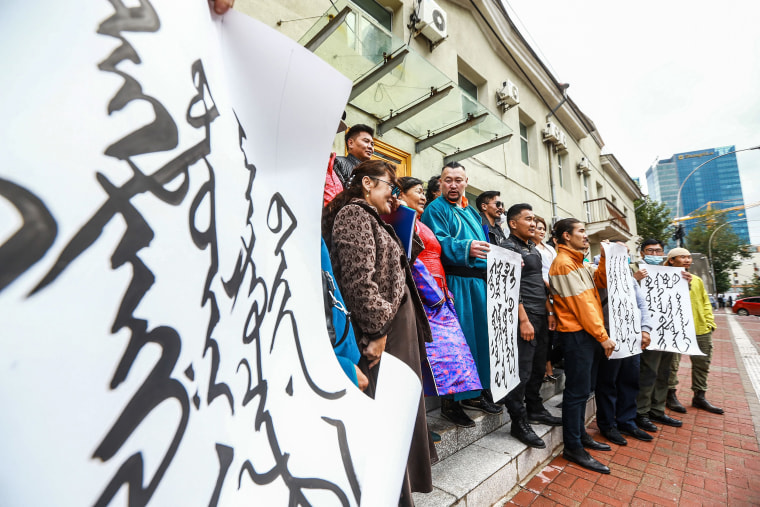As schools around the globe prepare for a new term amid the coronavirus pandemic, ethnic Mongolians in China have staged rare protests over a plan to remove the Mongolian language from parts of the curriculum, according to an advocacy group.
Angry crowds of students and parents gathered outside schools this week in the Inner Mongolia region of China, also referred to as Southern Mongolia, in videos shared by the New York based Southern Mongolian Human Rights Information Center.
Guidelines came into force on Tuesday in the Chinese-administered region that will over the course of the next few years require elementary and secondary school subjects including history and politics to be taught in Mandarin — the predominant language of China.
"This is the total eradication of Mongolian language, culture and identity," said Enghebatu Togochog, director of the Southern Mongolian Human Rights Information Center, calling the move part of a wider "cultural genocide" of the minority group.
"People from all walks of life of Southern Mongolia are organizing themselves to make this an unprecedented scale of non-violent civil disobedience resistance movement possible," he told NBC News by email.
"No Mongolian feels Chinese at all. This is exactly what makes the Chinese disappointed."
The rights group said protesters began organizing as early as June but that this week's demonstrations saw tens of thousands of people gather. NBC News could not independently verify the figures.
The standardization of national education is a key policy drive under President Xi Jinping, largely focusing on promoting loyalty to China and the ruling Communist Party.
The program to replace ethnic languages in core subjects has also been deployed in Xinjiang, home to the Muslim minority Uighurs, and Tibet — areas known for unrest with authorities.
Equal rights for minorities are guaranteed in the Chinese constitution in a country with over 300 languages, said Dr. Nathan Hill, specialist in East Asian languages and cultures at SOAS, University of London. But under Xi, the state was seeking greater "uniformity," he said.
"The one-party state feels insecure and that insecurity bleeds into everything — and part of that is minorities," said Hill. "The state is always going to favor assimilation and that's what we're seeing now."
Download the NBC News app for breaking news and politics
Hill said that until recently, Mongols had not come in for as much scrutiny as Uighurs and Tibetans and were often considered more "loyal" minorities, but that the coronavirus pandemic had allowed the state to become bolder.
Despite this, Hill said the Mongolian language was not facing any short-term threat and is still widely spoken by millions and published in newspapers throughout the region.
In an official policy interpretation posted online on Monday, the Inner Mongolia People’s Government, a state body, defended the changes.
"If ethnic minority students learn the national commonly-used language well, it will be beneficial for their employment, acquisition of modern scientific and cultural knowledge, and integration into society," it said.
Local civil unrest is unusual in China, where the internet is tightly controlled and police swiftly crackdown on demonstrations.
The former President Tsakhia Elbegdorj of the independent nation of Mongolia — sandwiched between Russia and China and sharing a border with the Chinese-administered Inner Mongolia — called on China to be "responsible," on social media on Tuesday.
"We need to voice our support for Mongolians striving to preserve their mother tongue and scripture in China. The right to learn and use one's mother tongue is an inalienable right for all," he wrote online, alongside photos of young children holding placards.
Reuters contributed to this report.


